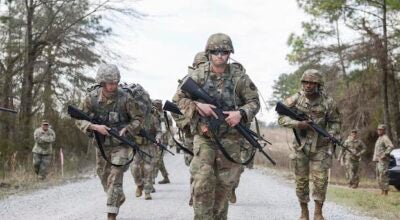Kaiser workers go on strike
Published 12:00 am Monday, October 5, 1998
LEONARD GRAY / L’Observateur / October 5, 1998
GRAMERCY – Workers at Kaiser Aluminum walked out Thursday night, and replacement, or “scab” workers, swept in to keep the plant in operation.
The nationwide strike, with 3,000 union members on the picket lines, has already prompted a production cutback, according to a statement released Wednesday.
At Gramercy, 345 workers are on strike, while a hastily-erected watchtower stands vigil on Airline Highway’s main gate. The plant isoperating at 93 percent capacity, and management hopes to have it at 100 percent in five to seven days.
“You never know what may happen,” said Kaiser President Ray Milchovich during a press conference Friday. “It’s just a prudent thing to do.”The facilities continue to operate with temporary workers, salaried employees, retirees and others.
During a conference call with reporters Friday afternoon, Kaiser Chairman George Haymaker Jr. voiced his disappointment with the strike, especiallyas the union negotiators refused to say to what they objected.
Meanwhile, picketers set up operations on Airline Highway as other strikers milled around the labor union’s headquarters in Lutcher Town Hall.
A statement from United Steelworkers of America Local 15702 cited unfair labor practices by Kaiser, including: Refusing to provide critical productivity information upon which the entire company approach to bargaining was based.
Making a contract settlement offer contingent on not striking, in effect, punishing union members for exercising their right to strike.
Proposing to take pension service away from employees in retaliation for going on strike.
Refusing to bargain over mandatory subjects of bargaining such as safety welding and return to work protocols.
The union’s call to strike came after the prior labor agreement expired at 7 p.m. Wednesday and after the union requested a brief extension toconsider the company’s final proposal.
That extension expired at 10:30 p.m. Wednesday.Milchovich, asserted in a press release: “We had an offer on the table that not only improved the standard of living for the represented employees but also enabled the continuation of productivity improvement that is essential in today’s competitive aluminum industry.”Negotiations ceased after 16 days of bargaining talks in Minneapolis. Thestrike affects five facilities across the nation, in the towns of Tacoma and Spokane, Wash.; Newark, Ohio; and Gramercy.Locally, St. James Parish President Dale Hymel Jr. has been involved inpromoting an agreement, hearing presentations by each side of the labor dispute.
“I hope they keep talking, but I can’t get too involved one way or the other,” he said.
He added his primary concern is the safety of the community, as replacement workers may not be current on present safety practices. “Ihope there’s no emergency,” Hymel said.
David Foster, chairman of the union’s negotiation team, said he objected to company demands that would have cut Kaiser’s hourly work force across the nation by 400 jobs, or nearly 20 percent, including 57 jobs in Gramercy.
Milchovich responded, “I don’t know how they arrived at that number.” Hesaid the actual figure is closer to 100 jobs.
Foster continued: “Our goal in these negotiations was to gain increased security at Kaiser in exchange for the sacrifices our membership has made for more than 15 years to bring the company back to profitability.”He continued, “Kaiser’s out-of-state management had a different idea.
They wanted to reward our sacrifice by taking a meat axe to their work force, permanently eliminating at least 400 of our 3,000 jobs and demanding an essential unfettered right to contract out hundreds more.” The last strike at Kaiser took place in 1995 and lasted eight days. Kaiseropened its doors in Gramercy in 1956.
Return To News Stories




